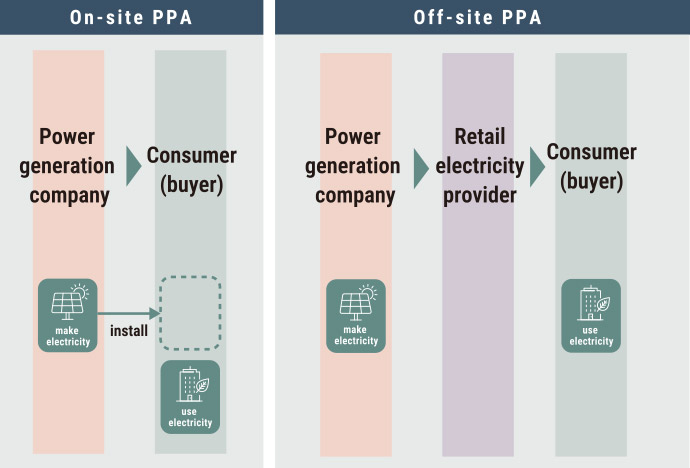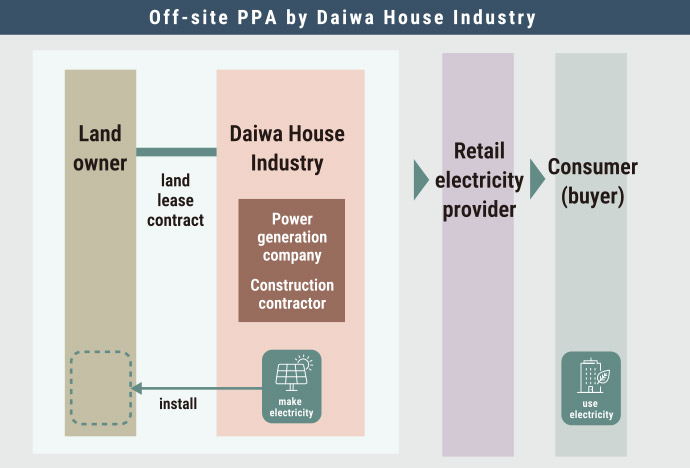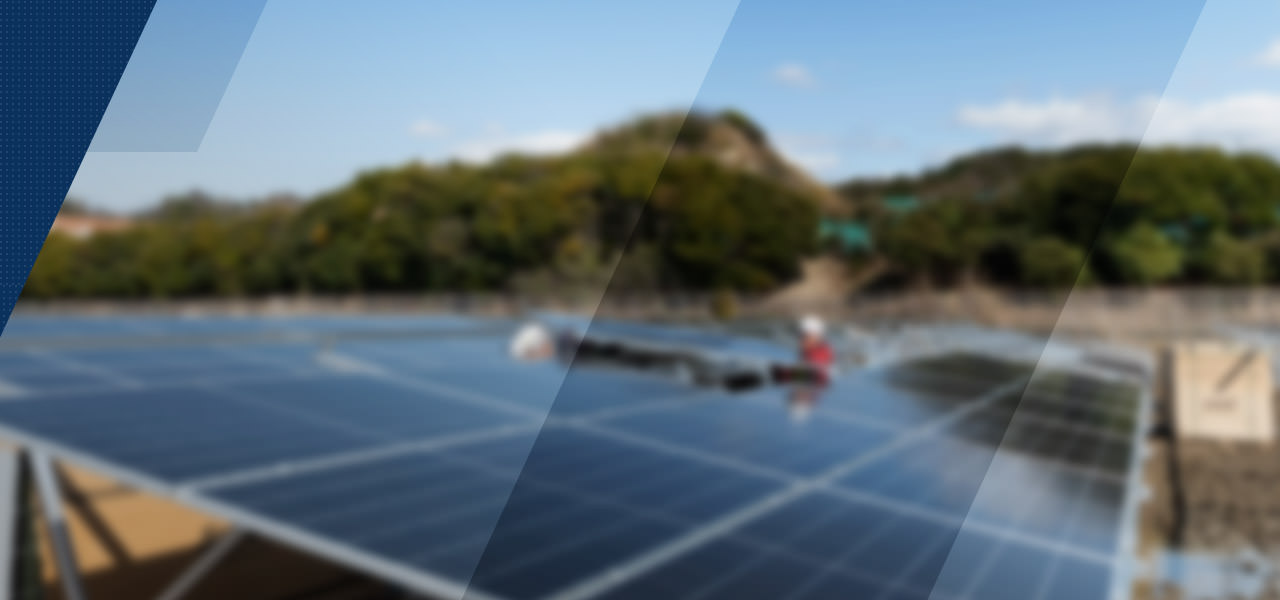

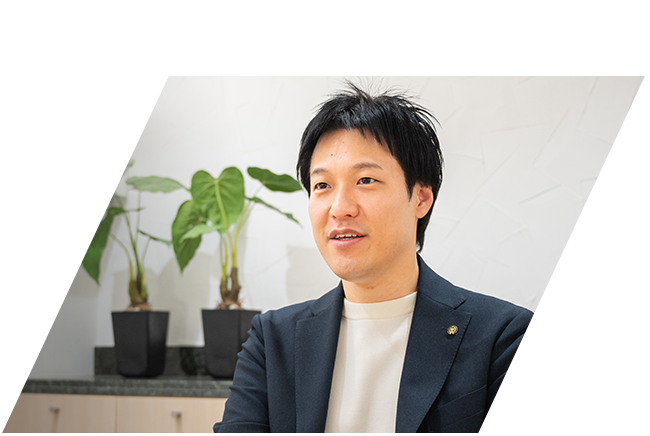
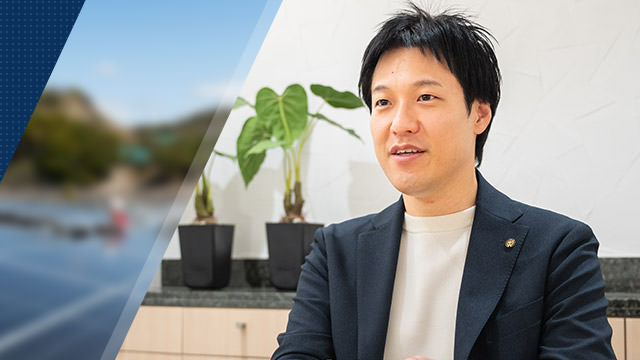 “Tackling the Challenges
“Tackling the Challenges
of Carbon Neutrality”
Daiwa House Industry was quick off the mark in its Environment and Energy Business, and has sprinted toward securing a dominant position in the off-site PPA business.

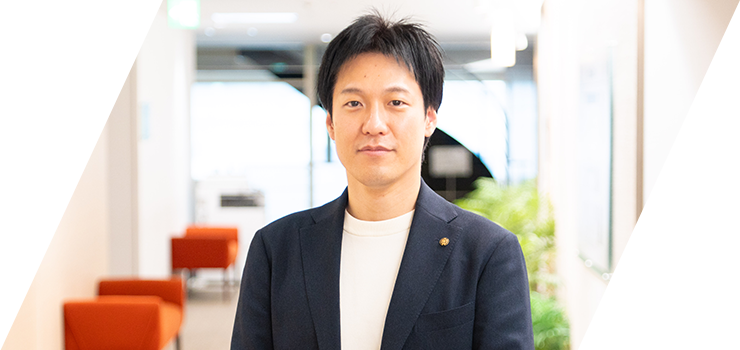
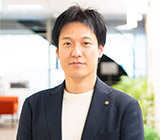

![]()

![]()
![]()
![]()
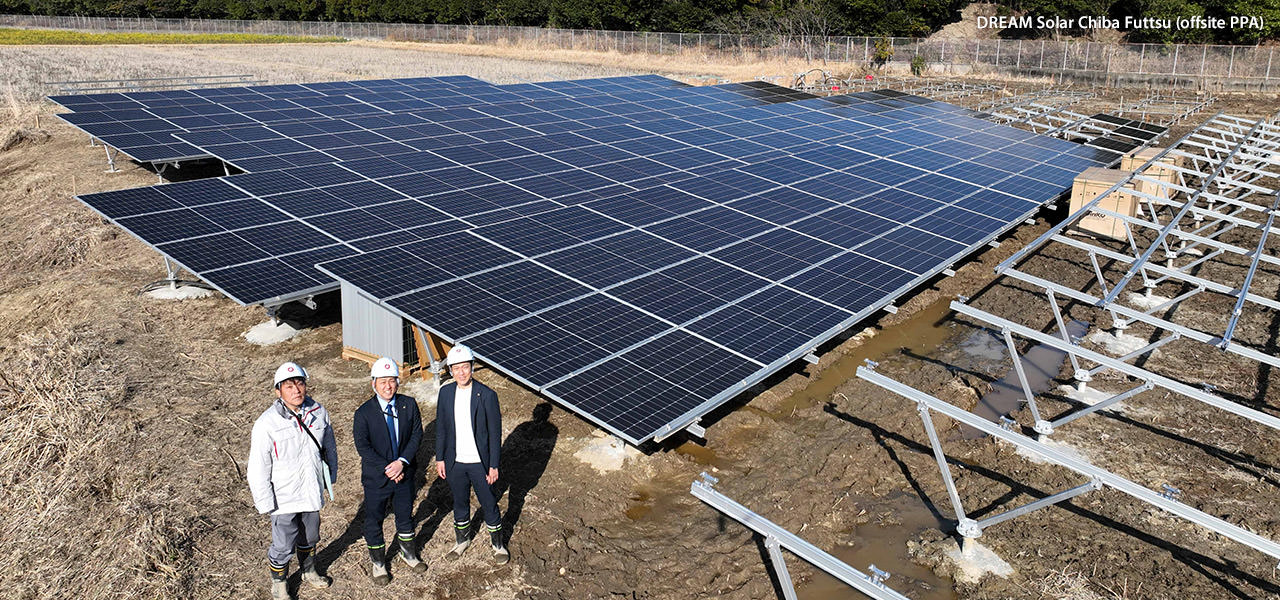
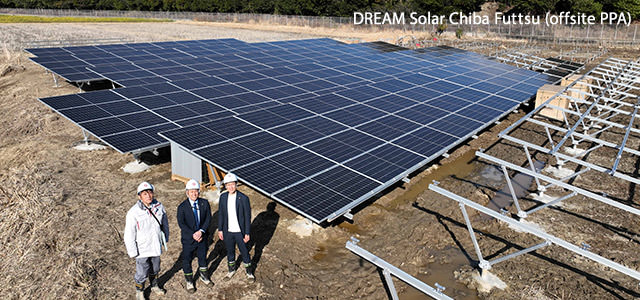

At the vanguard with the Environment
and Energy Business
It was the summer of 2023 and Hidenori Yashiki was bathed in a bright light as he ascended to a podium, having been selected as one recipient of the Daiwa House Award.
The reasoning behind this honor was for his “establishment of an off-site PPA scheme, and its commercialization.”
Yashiki was simultaneously delighted and confused. “It was more than just myself that brought about this success.” He knew that the moment came about only with the team efforts of the sales and technical staff, and everyone else at the division and business sites. Furthermore, in retrospect, there were his seniors who had worked with little fanfare from the days when environmental energy had been a less than popular subject for the public at large. The origin of all this was the concept of the “21st century challenges of wind, sun, and water,” as set forth by Nobuo Ishibashi, our founder. It was owing to those who came before us having cleared a path forward that we were able to welcome this day.
So how did we arrive to the point of making PPA into a business? Let’s take a comparative look at the histories of Germany, a leading country in terms of renewable energy, and Japan, which is playing catch up.
The year 1991 marked the start of “FIT” in Germany. This system obligates “power companies” to purchase the electricity generated by renewable energy sources. In 2009, the “FIP” system was introduced so that electricity could be sold directly to “consumers and markets” and a certain premium (subsidy) added to the price of electricity sold.
Japan at long last commenced the FIT system in 2012, the year following the Great East Japan Earthquake. A decade later, in 2022, the country introduced FIP.
So, what about the Daiwa House Group? We needed to catch up with the more advanced countries, and early on ramped up full-scale efforts with our establishment of the Environment and Energy Business Division in 2009. The entire Group worked to commercialize and market our products, and we branched out into the development of fluorescent light reflectors that reduce electricity use, energy storage systems, the “DREAM Solar” solar power plants, and “DREAM Wind” wind power plants.
When Yashiki joined Daiwa House Industry in 2013, it was at a time when the company was beginning to accelerate the engine of its renewable energy business. Yashiki had previously worked on the research and development of solar cell modules, and at the time, Japanese manufacturers were struggling under the pressure exerted by overseas-based companies. Under such conditions we wanted to break away from the development side and challenge ourselves in the field of promoting solar power generation to the world. Considering this, Yashiki sought out a place in Daiwa House Industry where he could thrive.
After joining the company, Yashiki was engaged in mega solar proposals, and built up the power generation business “IPP” scheme from zero. He also established a scheme to lease photovoltaic equipment, formulated business rules, and prepared contracts. Without any inhouse experience, he got these projects off the ground with the help of a leasing company and our internal administrative department.
In the meantime, the flow of time remained unstoppable. With the decline of FIT purchase prices, signs of FIT’s demise were beginning to emerge. Daiwa House Industry, which had grown its power generation business by utilizing FIT, would lose a major revenue stream. That was when removing ourselves from FIT became an urgent issue, and arising in its place was “PPA.”
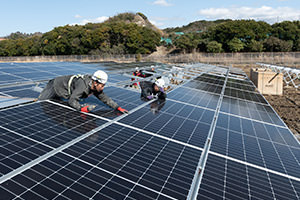
Our company carries out EPC (engineering, procurement, construction) & IPP (power generation)
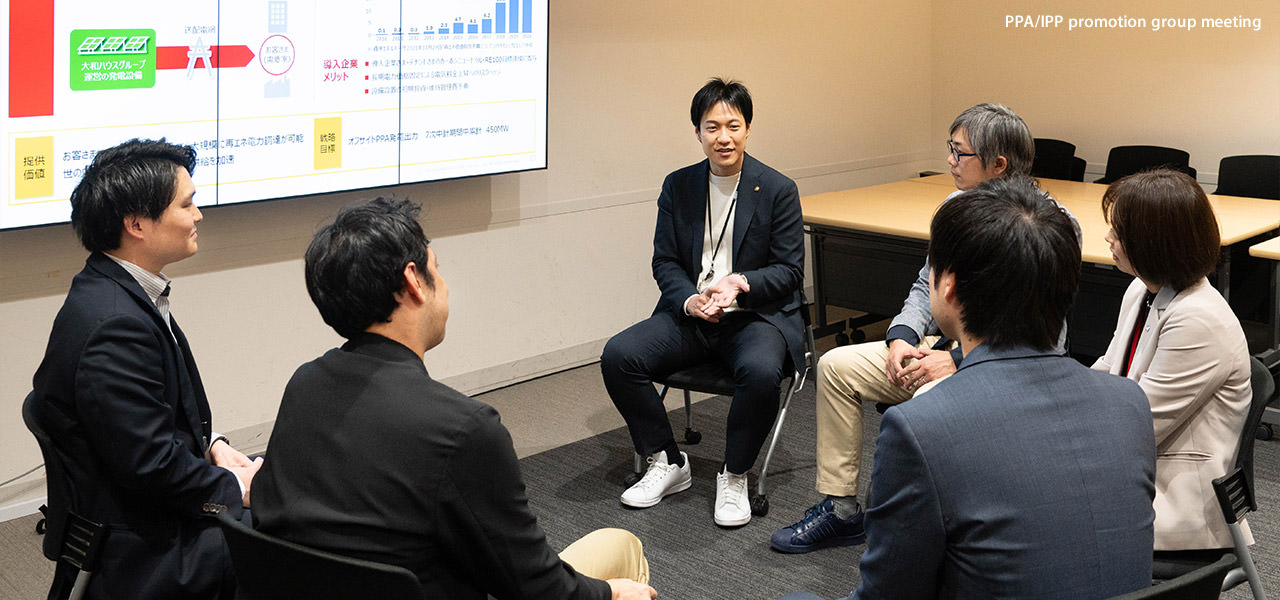
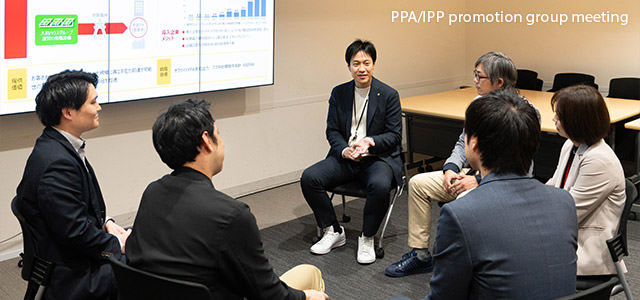

The struggles of bringing
about off-site PPA
A PPA (Power Purchase Agreement) is a contract whereby a “consumer (buyer),” such as a company that wishes to use renewable electricity, purchases electricity from a “power generation company.” In such a case, the “PPA” is stated differently depending on where the photovoltaic equipment is installed. Specifically, if installation takes place within the consumer’s premises (on site), it will be referred to as an “on-site PPA.” There, installation typically takes place on rooftops, and mainly two players are involved, the consumer and the power generation company. When installation occurs at a remote location outside of a company-held area (off site), it’s called an “off-site PPA.” Power is supplied via a power transmission and distribution network, from the generation site to where it is consumed. In this latter case, a retail electricity provider is included to make three primary players.
How does Daiwa House Industry perform within this framework? In 2017, Yashiki developed an on-site PPA scheme to propose the installation of photovoltaic panels to the roofs of customers’ newly constructed buildings and factories, or other areas. Here, Daiwa House Industry serves as the power generation company, while also handling construction.
Then in 2019, work began on planning an off-site PPA scheme, and this was the project that led to having received the award. It was more difficult than we had imagined. Back then and even now in 2024, the small number of companies active with off-site PPA also tells of the degree of difficulty involved. A first problem: an inability to find land to install equipment on. A suitable site would be land that is wide and flat, with good sunlight conditions. Initially, we struggled with land that was unsuitable for solar power generation, such as in snowfall areas. In addition, it’s preferrable to have a site where we can quickly access a power transmission and distribution network available for use at low cost. As growth in renewable energy surges, there is a lack of capacity in such networks, and it’s an expensive burden to pay for upgrade construction. These and other problems meant we had to scramble for suitable sites that were inexpensive and could be accessed quickly.
Next is the necessity to proactively go out and find consumers who will become buyers. Even when a prospect finally listens to what we have to say, they compare costs, such as those of thermal power. This is where a deal can fall apart. Also problematic is negotiating with large-scale power companies and other retail electricity providers. “We don’t deal with PPA” is what we hear as we get turned away at the door. Even when with great effort we finally land a meeting, the numbers don’t add up and a contract remains elusive. There are also cases where, even though our discussions had everything in order, the prospect cancelled at the last-minute.
According to Yashiki, “It was ahead of its time.” However, our founder’s spirit of “thinking far ahead to the future” represents our corporate culture. He added, “It’s important to get things done early. We will have everything at the ready when the off-site PPA market opens up.” Just as these words convey, the headwinds blowing against Daiwa House Industry as it moves forward as a pioneer will in the following years shift dramatically.
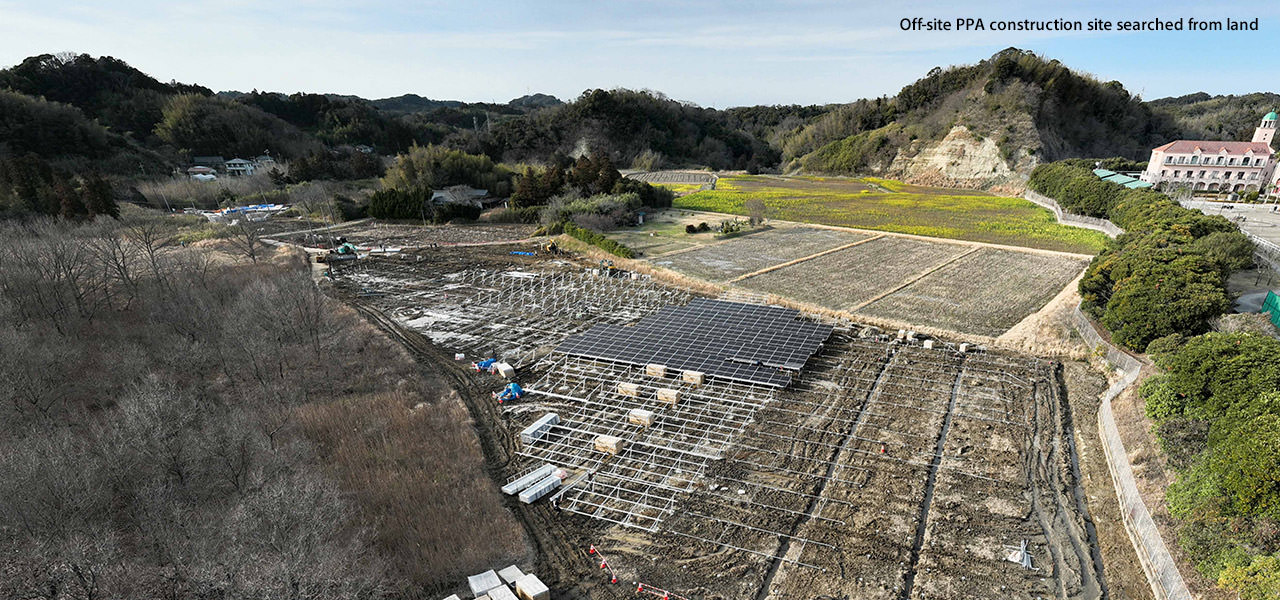
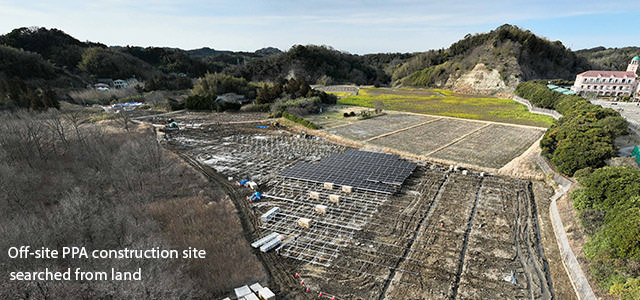

From finding land, one-stop shopping
The primary attributes of Daiwa House Industry lie in its overwhelming development strengths and its ability to offer total coordination for all aspects of off-site PPA. We search for wide-open land, negotiate with the landowner, and conclude leasing agreements. There we will build mega solar power generation plants to generate and deliver electricity. We can do everything in-house, from assigning retail electricity providers at the end of the line to setting things up for the consumer. The key players in the search for land are the sales representatives of the Environment and Energy Department, who are located throughout Japan. Even as appropriate land available for large-scale development decreases, these representatives will search out a steady stream of candidate sites utilizing their ability to gather land-related information based on extensive regional knowledge.
Ever confident in our high-quality power plant construction
Yashiki oversees negotiations with retail electricity providers. Over a year and a half, we built a cooperative framework with major electricity companies, gas companies and others throughout Japan. In addition, we prepare for the construction of power plants even before finding consumers, and in approximately two years, have made more than 700MW of connection examinations (confirming the possibility of connection to power transmission and distribution networks) with retail electric power companies. The results of this have been well considered, and we are now recognized as a cooperating partner. Moreover, under the 7th Medium-Term Management Plan, every year we conduct connection examinations for each of several hundred MW, and also set ambitious goals of dramatically increasing the cumulative amount of electricity generated.
Companies’ renewable energy needs have also been rising. We’ve been seeking out consumer companies that are aiming for carbon neutrality and reaching RE100, and as of today in 2024 have increased the number of companies in our portfolio to several dozen. The key to the off-site PPA business is an exit strategy that depicts “when,” “where,” and “at what price” electricity will be sold. When will a certain consumer require electricity? Which retail electricity provider will we use to deliver? Even if the power generation plant is in Tokyo, negotiations might not be limited to TEPCO or Tokyo Gas. Or it may be that at the current time what we need most is Hokkaido Electric Power Company, or maybe Okinawa Electric Power Company. In Yashiki’s office, there are dedicated staff that deal with specific major power companies in each area, and information is shared closely throughout the department. This organizational framework enables the best match between a retail energy provider and consumer. Teamwork is critical to not let an opportunity to reach an exit agreement slip away.
Our team members are a close-knit group. Having looked ahead to see the future potential of the Environment and Energy Business, many of the young members in the department are volunteers, and that is an attitude that meshes well with Yashiki, who had once jumped into a new position as a mid-career hire. Yashiki spoke of his great expectations, saying, “In the start-up phase of a new business, we need people like these men and women who have a forward-looking outlook in their approach, absorb a variety of daily experiences, and work to achieve personal growth.”
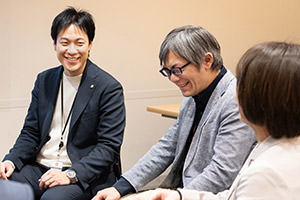
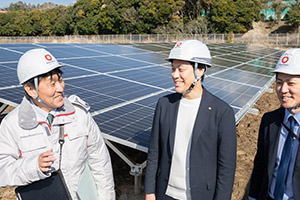
Headquarters and field work together to promote business
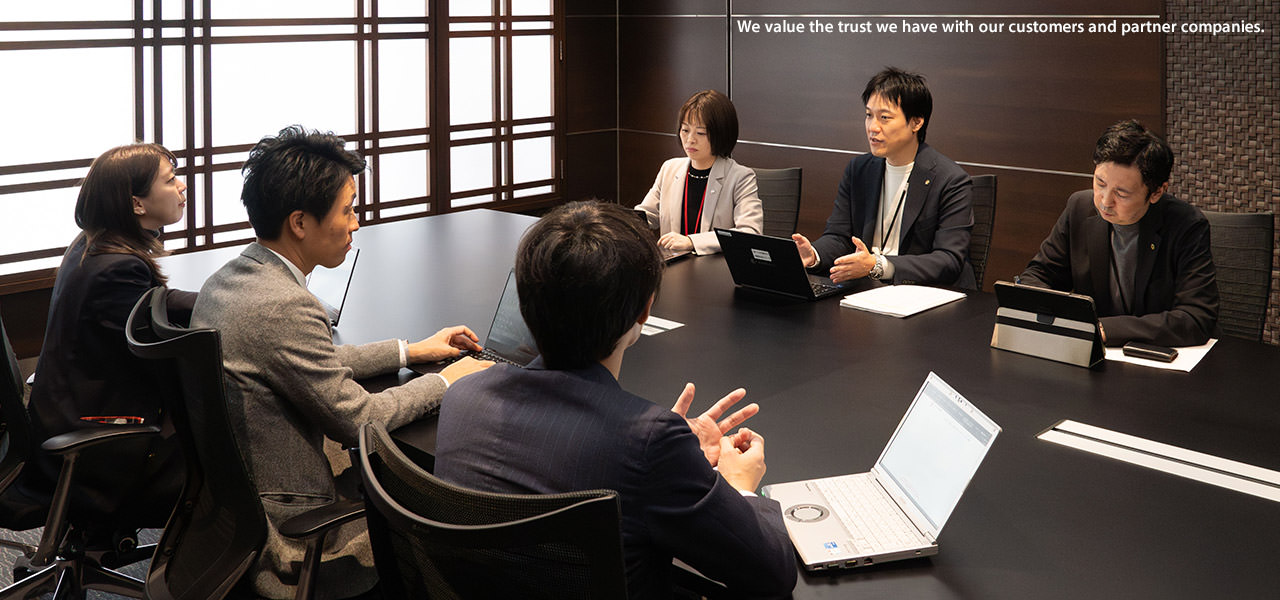
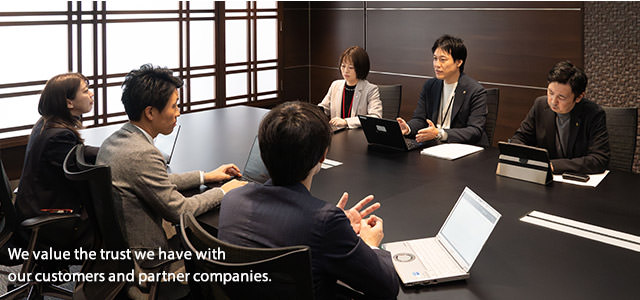

Aiming to be a top player
in the renewable energy world
Let’s now look at Daiwa House Industry from the perspective of a consumer company and retail electricity provider.
The consumer, Nichirei Corporation, is engaged in the development of processed foods, marine products, and other businesses. The retail electricity provider is Chubu Electric Power Miraiz Co., Inc., which delivers retail electricity and gas services as a sales company of Chubu Electric Power Group.
We heard from Kei Yoshida of Nichirei about why they deployed our off-site PPA. “Nichirei Group has set its sights on achieving carbon neutrality by 2050, and leading up to that we have established a goal of cutting CO2 emissions by 50% in fiscal 2030 compared to fiscal 2015 levels. As one element of this we were considering the procurement of renewable energy, and that’s when we received a proposal from Daiwa House Industry. Although we consulted with other companies, at the time most of them were still stumbling in the dark, and they told us that they would need a lengthy period of preparation. The period presented by Daiwa House Industry, on the other hand, was half that of those other companies. It was this consideration for speed, something we valued highly, that was the decisive factor. We have great confidence they will continue to be attentive to our needs and activities, and to be at our side as we march forward.”
The two proposed power generation sites were Tsu City, Mie Prefecture (approximately 1.3MW) and Mitoyo City, Kagawa Prefecture (approximately 1.1MW). Immediately after the proposal, they set about to collaborating with major power producer groups in the Chubu and Shikoku areas, and agreements were concluded in an expedited manner. This will result in a roughly 790-ton CO2 reduction in Mie, and about 600 tons of such emissions in Kagawa.
The first collaborative off-site PPA partner for Chubu Electric Power Miraiz was Daiwa House Industry. Both Takanori Miyabe and Yuki Kobayashi had words of praise for Daiwa House Industry, saying, “If the power generation companies are not reliable, we cannot recommend them to our consumers with confidence. Daiwa House Industry has a wealth of expertise and experience in FIT, so we can leave the design and construction to them with peace of mind, and it’s reassuring that they will attend to and accompany our customers to the site. In addition, if trouble occurs on the power plant side, there is a risk of diminished credibility and corporate value of the consumer, but Daiwa House Industry is in strict compliance with laws and regulations, and that gives us an even further sense of security.” We also asked about our strengths, as seen from the perspective of a power generation company that’s a member of the Chubu Electric Power Group. Miyabe explained, “They can find, negotiate, and build power plants on available land. We’re very grateful to have a partner that excels in areas where we are lacking.”
Currently, only a small number of people are responsible for the practical work of promoting the PPA business, and not many employees, either within the Environment and Energy Department or throughout the company, equate their own future with that of PPA. However, this chance came about precisely because we read “far ahead to the future.” The head of the department declared as our goal for the future that “if you talk about off-site power plants, then you’re talking about Daiwa House.” Before that we have the huge goal of becoming “a top player in the renewable energy world.”
Yashiki recalled the robot anime he had watched in his youth. In a future world, all energy would be provided by solar power. The longing he felt when he saw that has brought him to where he is today. He would like to tell his younger self that “what you wanted to do, you’ve accomplished.” However, “you are only part way to realizing your dreams.” There is every possibility of becoming a top player in the renewable energy world. We are now standing in a place where our dreams are within reach.
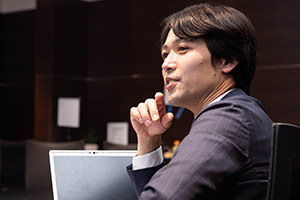
Kei Yoshida
Nichirei Corporation
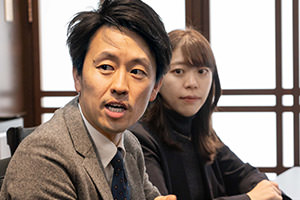
(left)Takanori Miyabe
(right)Yuki Kobayashi
Chubu Electric Power Miraiz Co., Inc.
*Stated information is as of March 2024.
-
 "Tackling the Challenges of Carbon Neutrality"
"Tackling the Challenges of Carbon Neutrality"
-
 "Building Close Relationships with Our Customers"
"Building Close Relationships with Our Customers"
-
 "Transforming the Construction Sector with DX"
"Transforming the Construction Sector with DX"
-
 "Bringing Ever-More Joy to Travel in Japan"
"Bringing Ever-More Joy to Travel in Japan"
-
 "Regeneration" Arises from New Construction
"Regeneration" Arises from New Construction
-
 "An Enduring Spirit of Hospitality"
"An Enduring Spirit of Hospitality"
-
 "Collaborating with 16 creators invited from around the world"
"Collaborating with 16 creators invited from around the world"
-
 "Passing Down Hometown to Future Generations with Renewable Energy"
"Passing Down Hometown to Future Generations with Renewable Energy"
-
 "The twenty-first century will be wind, solar, and hydro"
"The twenty-first century will be wind, solar, and hydro"
-
 "Be a Pioneer in the Design Revolution"
"Be a Pioneer in the Design Revolution"
-
 "Building better places to live through partnership between the public and private sectors"
"Building better places to live through partnership between the public and private sectors"
-
 "Supporting the foundations of the nation"
"Supporting the foundations of the nation"
-
 "Continuing to work the rest of life"
"Continuing to work the rest of life"
-
 "Doing our best to support post-disaster reconstruction"
"Doing our best to support post-disaster reconstruction"
-
 "Defying common wisdom in housing construction"
"Defying common wisdom in housing construction"
-
 "Develop the American market!"
"Develop the American market!"
-
 "Exporting Japanese industrial parks"
"Exporting Japanese industrial parks"
-
 "Industrializing agriculture"
"Industrializing agriculture"


